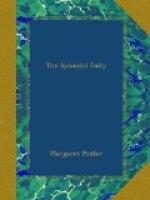“Yes—Sonia.” The old maestro’s eyes kindled with a soft luminance as his whispering voice caressed the little flame. “Hers, of course, had been merely a marriage dictated by reasons of State, and from the time of our first meeting, our hearts were in each other’s keeping. But she never failed in duty or in loyalty. Only once, when I was leaving Ruvania, never to return, did she give me her lips at parting.” Again he fell silent, his thoughts straying back across the years between to that day when he had taken farewell of the woman who had held his very soul between her hands. Presently, with an effort, he resumed his story. “I stayed at the Ruvanian Court many years—there was a post of Court musician which I filled—and for both of us those years held much of sadness. The Grand Duke Anton was a domineering man, hated by every one, and his wife’s happiness counted for nothing with him. She had failed to give him a son, and for that he never pardoned her. I think my presence comforted her a little. That—and the child—the little Nadine. . . . As much as Anton was disliked, so much was his brother Boris beloved of the people. His story you know. Of this I am sure—that he lived and died without once regretting the step he had taken in marrying an Englishwoman. They were lovers to the end, those two.”
Listening to the little history of those two tender love tales that had run their course side by side, Diana almost forgot for a moment how the ripples of their influence, flowing out in ever-widening circles, had touched, at last, even her own life, and had engulfed her happiness.
But, as Baroni ceased, the recollection of her own bitter share in the matter returned with overwhelming force, and once more she arraigned him for his silence.
“I still see no reason why you should not have told me the truth about Adrienne—about Nadine Mazaroff. Max couldn’t—I see that; nor Olga. But you were bound by no oath.”
“My child, I was bound by something stronger than an oath.”
The old man crossed the room to where there stood on a shelf a little ebony cabinet, clamped with dull silver of foreign workmanship. He unlocked it, and withdrew from it a letter, the paper faintly yellowed and brittle with the passage of time.
He held it out to Diana.
“No eyes but mine haf ever rested on it since it was given into my hand after her death,” he said very gently. “But you, my child, you shall read it; you are hurt and unhappy, battering against fate, and believing that those who love you haf served you ill. But we were all bound in different ways. . . . Read the letter, little one, and thou wilt see that I, too, was not free.”
Hesitatingly Diana unfolded the thin sheet and read the few faded lines it contained.
“CARLO MIO,
“I think the end is coming for Anton and for me. The revolt of the people is beyond all quelling. My only fear is for Nadine; my only hope for her ultimate safety lies in Max. If ever, in the time to come, your silence or your speech can do aught for my child—in the name of the love you gave me, I beg it of you. In serving her, you will be serving me.




